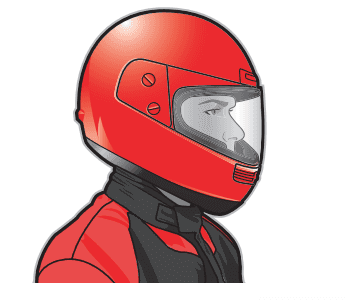What are the Mississippi helmet laws? Interestingly, Mississippi has no law requiring cyclists to wear helmets – any person of any age can operate a bicycle without wearing a helmet ( it’s not advisable, though); however, Mississippi does require all motorcyclists and their passengers to wear helmets in keeping with the regulations approved by the American Association of Motor Vehicle Administrators.
Who Should Wear a Motorcycle Helmet?
By Mississippi law, both operator (driver) and passenger should wear a motorcycle helmet.
What’s the Specific Law That Requires a Helmet in Mississippi?
Under Title 63 of the Motor Vehicle and Traffic Regulations, Section 63-7-64, Motorcycle Crash Helmets, “No person shall operate or ride upon any motorcycle or motor scooter upon the public roads or highways of this state unless such person is wearing on his or her head a crash helmet of the type and design inspected and approved by the American Association of Motor Vehicle Administrators…” In layman’s terms, everyone should be wearing a helmet when riding a motorcycle on Mississippi roads.
What Does an Approved Helmet Look Like?
Helmet manufacturers are working to make helmets less expensive, stronger, lighter, and more comfortable. You can find helmets at different price points. Some have coordinating outfits or match your bike too! Always choose a helmet that meets the minimum safety standards (preferably more than minimum). To find a well-made, safe helmet find the DOT sticker on the inside or outside of the helmet, meaning the helmet complies with the U.S. Department of Transportation safety standards. Make sure your helmet fits you well.
For additional safety, look for a Snell sticker. That means the helmet complies with rigid testing standards:
- Impact: shock absorbing capacity
- Penetration: ability to withstand a blow from a sharp object
- Retention: chin strap’s ability to stay fastened without stretching or breaking
- Peripheral Vision: must provide side vision of 105 degrees on each side (most human vision is 90 degrees on each side).
Manufacturers recommend that you replace your helmet every few years or if it shows signs of damage. Replace especially if you’ve been in a crash as the helmet will have sustained impact and will no longer be safe to wear. For all newly manufactured helmets, the chin strap will have a printed month and date of production on it; if it doesn’t, the helmet is old and should be replaced.
What Are the Different Types of Helmets?
- Full face helmet: gives you the most protection because it covers your face completely.
- Three-quarter, open face helmet: constructed with the same components of the full-face, without offering face and chin protection. It’s recommended you use a snap-on face shield for this type of helmet, or wear goggles that can withstand stone and debris impact.
- Half-shell helmets: protect less of the head and are not recommended.
- Novelty helmets: be wary of novelty helmets with thin or no liner. These should be avoided at all costs.
Why Do I Need to Wear a Helmet?
Helmets, especially a full face helmet, protect your brain, face, and your life from harm. Head injuries are often the reason for most motorcycle fatalities. Motorcycle helmets are designed for purpose.
Four components work in conjunction to provide optimal protection: an outer shell, an impact-absorbing liner, comfortable padding, and a retention system.
- Outer shell: made from fiber-reinforced composite or thermoplastic (like polycarbonate). It is tough, but designed to compress when it hits a hard object, dispensing energy and lessening the impact and force before reaching your head.
- Impact-absorbing liner: made of expanded polystyrene (styrofoam). It’s a dense layer that cushions and absorbs shock, stopping your head from moving from side to side. This material compresses along with the outer shell to spread the impact throughout the material and not to your head.
- Comfort padding: soft foam and cloth layer that goes next to the head. It helps the helmet sit snug and feel comfortable. The padding can often be taken out for cleaning.
- Retention system: the chin strap is very important as it keeps the helmet on the head during impact. The strap connects the sides of the shell.
Make sure you always fasten your helmet securely on your head. Every time you reach for your keys, make a habit of reaching for your helmet too. The two should become an automatic action – even going on a short ride isn’t safe without a helmet!
How Likely Is It That I’ll Be Involved in an Accident? I’m a Safe Driver!
Under the most recent study (2013), 14% of traffic fatalities were from motorcycle crashes – 4% of all people injured. There were 18% driver and passenger fatalities. Of 4,668 motorcyclists killed that year, 94% of them were riders/drivers, and 6% passengers.
What if I’m in an Accident and I Wasn’t Wearing My Crash Helmet?
If you violated the helmet law and you file a personal injury lawsuit against the driver who is to blame, your lack of helmet can harm your case. If you were wearing a helmet, this rule no longer applies.
Mississippi follows a “comparative fault” rule for personal injury cases, and if you bear some level of negligence (especially if you’re claiming for head injuries that could’ve been prevented with a helmet) any damages awarded could be reduced by a judge by a percentage equaling your share of the legal blame. That doesn’t mean that you will not receive compensation, but you will often not receive full compensation.
What Do I Do After I Am Involved in an Accident?
Speak to a trusted personal injury attorney who can advise you about your case. At Coxwell & Associates, PLLC, we have over 35 years of experience dealing with personal injury cases. Call us today for a consultation.
Disclaimer: This blog is intended as general information purposes only, and is not a substitute for legal advice. Anyone with a legal problem should consult a lawyer immediately.


